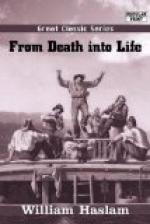I have been telling hitherto of blessing and prosperity in the Lord’s work. Many more cases might have been mentioned, and many other things of not less moment and interest; but enough has been said, I hope, to show the character of the work, and give some idea of the amount of blessing which attended it. But it must not be supposed that the offence of the cross had ceased, or that the enmity of the carnal mind was never stirred; indeed, I always doubt the reality of a work which moves on without opposition. On the day of Pentecost, when the Holy Ghost was first given, while believers were rejoicing, and sinners were pricked to the heart, and some mocked, there arose the opposition of others, who resisted the influence of the Spirit; and being “cut to the heart,” they gnashed with their teeth, and went forward in furious contention against the Lord’s work. So it was with us.
The opposition ran very high, but I do not think it was of malice or hatred, but rather “righteous indignation.” The instigators of it were serious and earnest persons, who verily thought they were doing right. They tried first to save me from what they considered was my infatuation; and failing that, did all they could to save others from my bad influence. “I bear them record, that they had a zeal for God, but not according to knowledge.” It was just such a zeal as I had before I was converted; therefore my heart’s desire was drawn out towards them, and I made continual efforts to win them.
One dear friend of old time said he felt “so hurt” because I was changed, and often wondered why “God did not strike me dead for all the harm I had done to the Church.” Another said that he “should not be surprised if the very ground opened and swallowed me up for my fraternizing with schismatics. The sin of Korah, Dathan, and Abiram was nothing to mine.” At the Clerical Meeting, which I attended notwithstanding all this stir against me, I was beset on every side with something more than loving reproaches; for evidently my old friends were very much grieved, and could not forgive me for what they considered the betrayal of Church principles.
A special meeting or synod of the clergy was convened by the Rural Dean, to take into consideration among other things, my defection, and to decide what public notice should be taken on the subject of this great scandal. I also attended this meeting, and found my brethren in a very angry and excited state. One after another got up and made grievous charges against me, about the proceedings in my church and parish. The burden of their distress, however, seemed to be noise and excitement.




